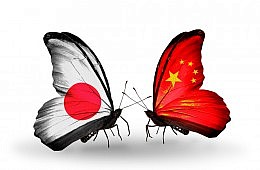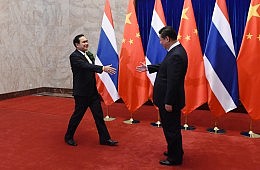- TOPICS
- BLOGS
- DIPLOMACY
- ECONOMY
- ENVIRONMENT
- FEATURES
- INTERVIEWS
- MAGAZINE
- PHOTO ESSAYS
- PODCASTS
- POLITICS
- SECURITY
- SOCIETY
- VIDEOS
- BLOGS
- CHINA POWER
- FLASHPOINTS
- ASIA DEFENSE
- ASEAN BEAT
- THE PULSE
- THE KOREAS
- TOKYO REPORT
- THE DEBATE
- CROSSROADS ASIA
- PACIFIC MONEY
- ASIA LIFE
- OCEANIA

China's Dream Doesn't Have to Be Japan's Nightmare
Thanks to President Xi Jinping, the Chinese dream has become a household word in China and is fast gaining international attention. The Chinese dream, said Xi shortly after he became the top leader of the Chinese Communist Party in October 2012, is the great rejuvenation of the Chinese nation. This great rejuvenation has many dimensions: economic, diplomatic, cultural, and military. The military dimension, one may safely surmise, is to make China a militarily powerful country, one that will never suffer another “century of humiliation” at the hands of foreign powers.
By many indicators, China is already a formidable military power, probably second only to the United States. And there is no better way than a pompous military parade to show to the Chinese people and the rest of the world that the military dimension of the Chinese dream has already come true. However, China normally holds a major military parade on every tenth anniversary of the founding of the People’s Republic (e.g. 1999 and 2009), and that’s why Beijing’s decision to have such a parade in 2015 caused much speculation and concern both inside and outside China.
The official explanation, as given by the spokeswoman of the Chinese Ministry of Foreign Affairs, is to commemorate the 70th anniversary of the end of World War II. “By hosting commemorative events with other counties,” she said, “China is to awaken each and every virtuous man’s desire for and commitment to peace, to refresh people’s memory of the history and love for peace, and to showcase China’s staunch position of upholding the victory of WWII and the post-war international order, and safeguarding world peace.”
Yet in light of Japan’s role in the Second World War and the current state of China-Japan relations (arguably at the lowest point since 1972), some foreign analysts suspect this unusually-timed show of force is primarily a message for Japan, which is viewed by many Chinese as having decidedly embraced historical revisionism under the current Shinzo Abe administration. Some comments published by the People’s Daily online — calling on Beijing to show its military muscles to Tokyo — seem to have only added to foreign observers’ suspicion and concern.
Perhaps one purpose of this year’s military parade is to “intimidate” Japan and — by extension — the United States, because the latter two countries have a military alliance that is presumably targeted at China. There could be other purposes, however. Chairman Mao once famously said, “Political power grows out of the barrel of a gun.” What this aphorism means — at least in the Chinese political context — is that whoever controls the Chinese military also dominates the party-state. And a high-profile review of armed forces is probably the most effective way to demonstrate one’s political dominance in Chinese politics and to deter or coerce potential rivals. Since the ongoing anti-corruption campaign launched by Xi Jinping in 2013 has taken down an unprecedented number of high-ranking officials, it would be indeed surprising if Xi has not already encountered serious internal opposition. Presiding over a major military parade could simply be Xi’s way of asserting his authority.
But let’s assume that the planned military parade is indeed partly aimed at Japan. Now the question becomes whether Japanese leaders will heed the message and behave differently. The answer is most likely no. For one thing, there is the U.S.-Japan military alliance. To be sure, between the two allies there were and still are many disputes, but there is no sign that they will go their separate ways any time soon. For another, the Chinese military is superior to its Japanese counterpart in quantitative terms, but its combat readiness is highly questionable. Rampant corruption — as evidenced by the investigation of dozens of top generals — strongly suggests that the Chinese military is yet not ready for a showdown in the East China Sea. Last but not least, if Chinese leaders believe that being tough with Japan could help them score political points at home, why wouldn’t Japanese politicians believe that standing up against Chinese “bullying” would help them win votes at the next election?
Since 1894 Japan has never had to confront a powerful China, and the latter has never had to face a weak Japan. All this changed beginning in the 1990s, with the rapid rise of China and the concomitant rise of strident Chinese nationalism. For a significant number of Chinese officials and ordinary citizens, a key component of the Chinese dream should be the subjugation of Japan — militarily if necessary. Given deep-rooted animosities between the two nations, such a dream is certainly understandable. But this dream will only bring about another round of devastation in East Asia. The great rejuvenation of the Chinese nation should not be premised on single-minded revenge against Japan. On the contrary, if the two biggest powers in East Asia cannot co-exist peacefully, the Chinese dream will be empty talk. So no Japan left behind.
Note that all comments are moderated and your comment may not appear immediately.



No comments:
Post a Comment